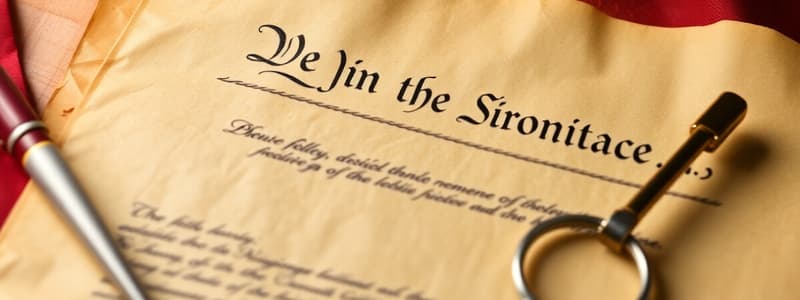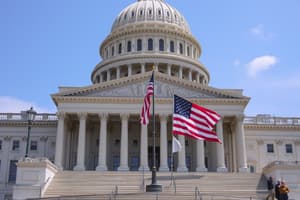Podcast
Questions and Answers
What is the primary purpose of the Bill of Rights?
What is the primary purpose of the Bill of Rights?
- To establish the framework for a new government
- To outline the powers of Congress
- To create an alliance of sovereign states
- To protect fundamental rights and liberties (correct)
Which plan proposed a one-house national legislature where each state would have one vote?
Which plan proposed a one-house national legislature where each state would have one vote?
- Virginia Plan
- Connecticut Compromise
- New Jersey Plan (correct)
- Great Compromise
What does the separation of powers refer to in a government?
What does the separation of powers refer to in a government?
- The combination of state and federal laws
- The division of responsibilities among three government branches (correct)
- The restriction of governmental powers through amendments
- The formation of a coalition among states
What does the term 'enumerated powers' refer to?
What does the term 'enumerated powers' refer to?
Which group opposed the ratification of the Constitution?
Which group opposed the ratification of the Constitution?
The Great Compromise established a Congress with what type of structure?
The Great Compromise established a Congress with what type of structure?
In a federal system of government, how is power divided?
In a federal system of government, how is power divided?
What does the supremacy clause state?
What does the supremacy clause state?
Flashcards
Federal system
Federal system
A system where power is divided between a national government and state governments.
Enumerated powers
Enumerated powers
Powers explicitly given to the federal government by the Constitution, like regulating commerce and declaring war.
Reserved powers
Reserved powers
Powers not specifically given to the federal government, reserved for the states, like education and local laws.
Separation of powers
Separation of powers
Signup and view all the flashcards
Checks and balances
Checks and balances
Signup and view all the flashcards
Bill of Rights
Bill of Rights
Signup and view all the flashcards
Constitution
Constitution
Signup and view all the flashcards
Representative government
Representative government
Signup and view all the flashcards
Study Notes
Anti-Federalists
- Opposed ratification of the Constitution.
Articles of Confederation
- Early form of government (1781).
- Established a weak central government.
- Alliance of sovereign states.
Bicameral Legislature
- Legislative body with two houses.
- Example: US Congress.
Bill of Rights
- First ten amendments to the US Constitution.
- Designed to protect fundamental rights and liberties.
Checks and Balances
- System in government.
- One branch limits another's power.
- Requires different branches to work together.
Confederation
- Decentralized form of government.
- Sovereign states form a union for specific purposes (e.g., defense).
Declaration of Independence
- Document (1776).
- American colonists declared independence from Great Britain.
- Listed grievances against the British king.
Enumerated Powers
- Powers specifically given to the federal government by the Constitution (Article I, Section 8).
- Include regulating interstate/foreign commerce, raising armies, declaring war, coining money, and conducting foreign affairs.
Federal System
- Form of government.
- Power divided between state and national governments.
Federalists
- Supported ratification of the Constitution.
Great Compromise
- Compromise between Virginia and New Jersey Plans.
- Created a bicameral Congress.
- Representation based on population (House) and equal representation (Senate).
Natural Rights
- Rights to life, liberty, and property.
- Believed to be given by God.
- No government can take away these rights.
New Jersey Plan
- One-house national legislature.
- Each state receives one vote.
Republic
- Form of government.
- Political power rests with the people, not a monarch.
- Power exercised by elected representatives.
Reserved Powers
- Powers not prohibited by the Constitution.
- Not delegated to the national government.
- Reserved for the states.
Separation of Powers
- Division of power among three branches of government.
Social Contract
- Agreement between people and government.
- Citizens consent to be governed as long as natural rights are protected.
Supremacy Clause
- Federal law superior to state laws.
- Article VI of the Constitution.
The Federalist Papers
- Collection of essays.
- Written by Hamilton, Madison, and Jay.
- Supported ratification of the Constitution.
Three-Fifths Compromise
- Compromise between Northern and Southern states.
- Counted enslaved people for representation and taxation. (60% of enslaved population)
Unicameral Legislature
- Legislature with only one house.
- Example: Confederation Congress.
Veto
- Power of the president to reject a law.
Virginia Plan
- Two-house legislature.
- Representation based on population (lower house).
- Upper house selected by lower house.
Studying That Suits You
Use AI to generate personalized quizzes and flashcards to suit your learning preferences.




